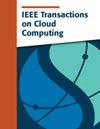Fog-Enhanced Personalized Privacy-Preserving Data Analysis for Smart Homes
IF 5
2区 计算机科学
Q1 COMPUTER SCIENCE, INFORMATION SYSTEMS
引用次数: 0
Abstract
The proliferation of Internet of Things (IoT) devices has led to a surge in data generation within smart home environments. This data explosion has raised significant privacy concerns and highlighted a lack of user-friendly controls. Consequently, there is a pressing need for a robust privacy-enhancing mechanism tailored for smart homes, safeguarding sensitive data from a user-centric perspective. In this article, we introduce the Fog-enhanced Personalized Differential Privacy (FEPDP) model, which utilizes the distributed nature of fog computing to improve data processing efficiency and security in smart homes. Specifically, the personalization, as a key feature of FEPDP, is manifested through an array of user-driven policy specifications, enabling home users to specify secret and privacy specifications for their personal data. These specifications not only enhance control over personal data but also align with the heterogeneous nature of smart home environments. Subsequently, aligned with fog-based smart home architecture, we propose two policy-driven partitioning mechanisms that utilize threshold partitioning based on dynamic programming to effectively implement FEPDP. Finally, comprehensive theoretical analysis and experimental validation across various statistical analysis tasks and datasets confirm that FEPDP achieves a superior privacy-utility trade-off for smart home data by leveraging non-sensitive data and fog-based partitioning.智能家居的雾增强个性化隐私保护数据分析
物联网(IoT)设备的激增导致智能家居环境中数据生成的激增。这种数据爆炸引起了人们对隐私的严重担忧,并凸显了用户友好控制的缺乏。因此,迫切需要一种为智能家居量身定制的强大的隐私增强机制,从以用户为中心的角度保护敏感数据。在本文中,我们介绍了雾增强的个性化差异隐私(FEPDP)模型,该模型利用雾计算的分布式特性来提高智能家居中的数据处理效率和安全性。具体来说,个性化作为FEPDP的一个关键特征,通过一系列用户驱动的策略规范来体现,使家庭用户能够为其个人数据指定秘密和隐私规范。这些规范不仅增强了对个人数据的控制,而且与智能家居环境的异构特性保持一致。随后,结合基于雾的智能家居架构,我们提出了两种策略驱动的分区机制,利用基于动态规划的阈值分区来有效实现FEPDP。最后,对各种统计分析任务和数据集进行了全面的理论分析和实验验证,证实了FEPDP通过利用非敏感数据和基于雾的分区,实现了智能家居数据的卓越隐私效用权衡。
本文章由计算机程序翻译,如有差异,请以英文原文为准。
求助全文
约1分钟内获得全文
求助全文
来源期刊

IEEE Transactions on Cloud Computing
Computer Science-Software
CiteScore
9.40
自引率
6.20%
发文量
167
期刊介绍:
The IEEE Transactions on Cloud Computing (TCC) is dedicated to the multidisciplinary field of cloud computing. It is committed to the publication of articles that present innovative research ideas, application results, and case studies in cloud computing, focusing on key technical issues related to theory, algorithms, systems, applications, and performance.
 求助内容:
求助内容: 应助结果提醒方式:
应助结果提醒方式:


